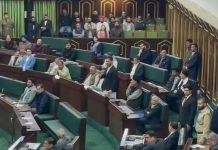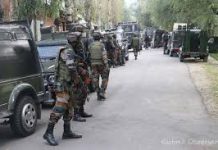Jammu, July 23, 22:The representatives of Yuva Rajput Sabha blocked Tawi Bridge here on Saturday in support of their long standing demand regarding the declaration of holiday on the birth anniversary of Maharaja Hari Singh on September 23 every year.
Looking at the gravity of the protest the Assistant Divisional Commissioner reached the site and gave patient hearing to the members of Sabha and informed that the Government has already taken cognisance of the matter. He told that a High Level Committee has been constituted and meetings have already been conducted in this regard. Moreover, DC , Avny Lavasa has herself assured the residents of Jammu region that a public holiday will be granted on September 23rd ( i.e Birth anniversary of Maharaja Hari Singh ) and the process will be completed before that. The committee formed in this regard has discussed facts and considered the views of prominent historians and academicians regarding contributions of Maharaja Hari Singh. Further deliberations are underway . He said that this is a genuine demand but this is not the right way to halt the traffic and create problem for the local people.
Maharaja Hari Singh was a Dogra ruler, who had signed the Instrument of Accession on October 26 1947, the legal document that ceded J&K to the dominion of India as per the Indian Independence Act 1947.
Watch Video
He was also concerned about the social injustices that prevailed in his state. Inspired from the emotional speech of Ambedkar decrying untouchability at the first Round Table Conference, Maharaja took it upon himself to end this menace in the state and in this quest, he didn’t dither to take up the cudgels against the Brahmin clergy that was opposed to let the doors of temples open for the Dalits. He also took drastic steps to end the menace of child marriage, prostitution and female infanticide. An extremely secular ruler as he was, he ensured that all his subjects enjoy equal political rights and status which puts him among a handful of princes who undertook such drastic reforms in their respective States. Every sector of the economy- sericulture, horticulture, tourism, health (TB sanatoriums and 3 modern Hospitals), education (Jabri schools, scientific institutions like RRL, scholarships to meritorious students) witnessed a transformative change.
The relevance of the Maharaja in Jammu can be gauged from the fact that despite almost 72 years after his forced exile and 60 years after his death, he has not vanished from the public consciousness and still continues to enamour people with the vast legacy that he has left behind.



